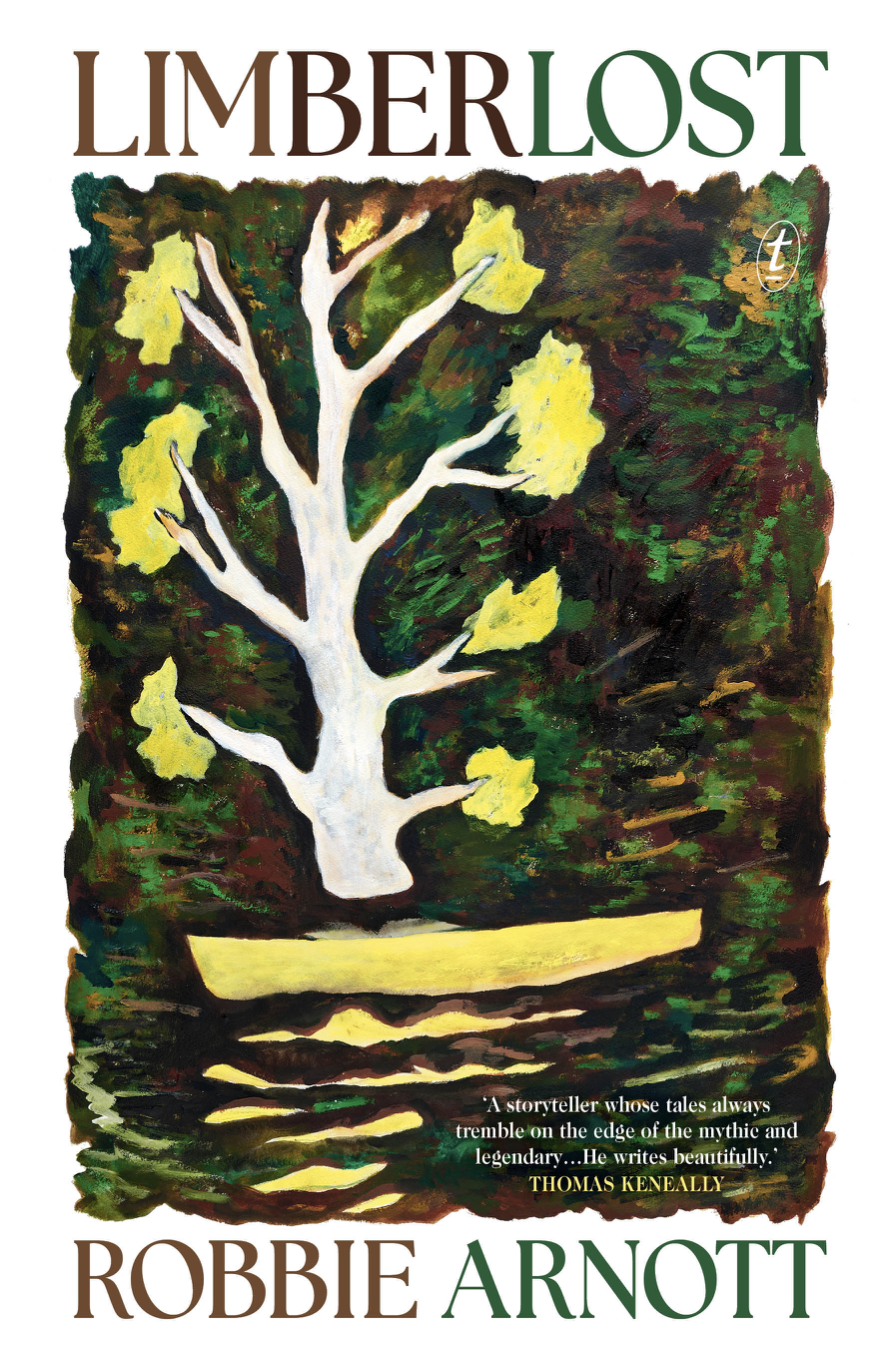Limberlost by Robbie Arnott
Tasmanian author Robbie Arnott’s third novel, Limberlost (2022), is both a step away from the magical realism of his previous work, and a step up in his appreciation of the magic of the natural world, the human relationship to land and sea, and the small but honest ways in which we fall captive to nature, love and responsibility.
Limberlost follows the life of Ned West, growing up on his family orchard called Limberlost, and growing into a man, husband and father as the years peel away. Jumping between various significant points in his life – most notably, the summer of his fifteenth year – Ned’s quiet coming of age story unfurls in the evocative and luscious prose that Arnott is so highly regarded for.
In mid-20th century rural Tasmania, Ned’s two older brothers are away at war, their whereabouts unknown, as his father and sister diligently try to hold things together on the apple orchard. Left largely to his own devices, fifteen-year-old Ned spends his time fishing with his best friend Jackbird, hunting rabbits for their pelts, and secretly dreaming of a boat he’ll buy with the money he hopes to get for them. As the days get hotter and the water all the more inviting, Ned’s life is fragmented by past, present and future: from capturing a quoll, buying his dream boat and trying to perpetually impress his sister, all the while feeling achingly brotherless, Limberlost takes us on a languid ride of childhood escapades.
The decisions Ned makes that childhood summer reverberate throughout his life in the many snippets we see of the following decades. These show Ned working various regional jobs across the rugged but luscious landscape of Tasmania, his relationship with his future wife then mother of his daughters, his struggle to keep up with the demands of his orchard, his family and social responsibility, as well as the many touchpoints of nature that seem to follow him wherever he goes.
It is the natural world of Tasmania that takes centre stage in the book, almost to the detriment of Ned’s ability to change anything at all throughout the course of his life. A quoll he captures and injures, then nurses back to health, is gone from his life as quickly as it comes into it; the rabbits he spends many mornings hunting sell, then buy him the boat he dreams of, only for it to be lost in a second of selflessness; a cow that he lets wander away from the herd and that he tries very hard to save suffers serious injury and dies during the night anyway; and the mad whale that opens the pages of Limberlost is touchingly tamed by the end. The circle of life, and the repetitive cycles of death and rebirth, dominate Ned’s story. He is often a bystander in all of this, even when his actions are carried along by the narrative, and his daydreams of escapism transport us to a time and place that’s free-flowing and safe: free from the stresses of the outside world and harboured from the darker connotations of nature. In these instances, nature becomes its perfect, abundant self.
“He turned to the shore and sailed for home, the oars still stowed, a feeling of ecstatic accomplishment flashing through him, a feeling beyond language. His life widened. Time wobbled. He grazed the truth of his dreams, grazed a world frozen perfect, if only for the length of dusk.”
Arnott’s writing is precise and utterly captivating, Ned’s story in his careful hands becoming an ode to our inextricable link to the land and the power of the natural world to captivate, delight and terrify. Like in his previous works, Flames (2018) and The Rain Heron (2020), there is a strong appreciation of the magic of nature running throughout Limberlost’s pages. Arnott’s ability to capture the landscapes of Tasmania with such nuance and tenderness lend the book’s natural world an aura so thick you feel like you could bite into it.
“The odours of trees belonged to their leaves and flowers; he’d assumed timber would be mute. He wondered at his wrongness, as the wood spice filled his lungs, sank into his blood.
The sight and smell. He felt tricked, drunk. He hadn’t known the world could do things like this to him.”
An undercurrent of emotions stirs in Ned throughout both his summer and the rest of his life. It is these quiet emotions that propel the narrative forward, and that make the flawed character of Ned all the more lovable. His plain, subconscious ache for news of his brothers, his feelings towards his duty on the orchard and in the wider world as provider of rabbit pellets for army hats, and his own personal longing for a boat to call his own all compete under the surface of his quite but diligent demeanour. In comparison, the last pages of the book are searingly emotional, a fruit of feeling so ripe by the end – filled with all the heartache, regret, and hard work that one life can carry – it bursts with stirring revelations.
“In that moment Ned felt a swelling, a ripping expansion, a hugeness that rang through him for the length of his life, a feeling that was sometimes rivalled but never quite matched.”
At its core, Limberlost is an evocative story of a boy growing into responsibility. Peppered with the wonderfully singular flora and fauna of Tasmania and rendered full and heartfelt by Arnott’s penchant for letting quiet sentences roar with true emotion, it is the perfect book to soak up nature.
Fruzsina Gál is an aspiring writer, born in Hungary but living in Australia. She has been a reader all her life, and her first short story, 'The Turul' was published in Griffith University's 2018 anthology, Talent Implied. Her writing is often focussed on identity and the effects of immigration on the self. You can find her online at www.fruzsinagal.com or @thenovelconversation.
